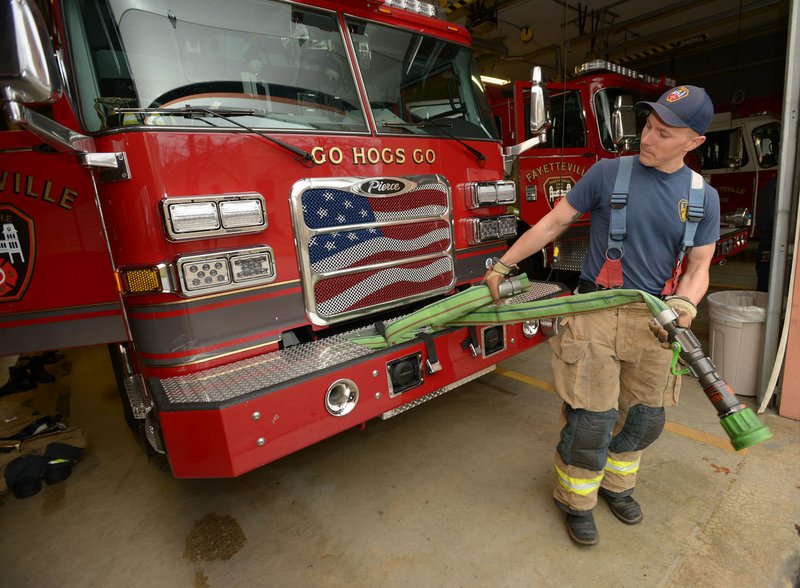FAYETTEVILLE -- Public safety is becoming a top priority for the city, administrators say.
The City Council on Tuesday will consider dedicating $1.8 million for the rest of the year to implement citywide pay raises. The full impact next year would be nearly $2.5 million.
Cost of recommended plan
A council measure to increase pay citywide would have the following impact on various funds for the remainder of the year:
General — $1,405,300
Street — $78,000
Parking — $12,700
Community Development Block Grant — $9,200
Parks Development — $42,200
Drug Law Enforcement — $21,900
Water and Sewer — $122,700
Recycling and Trash Collection — $68,700
Airport — $12,400
Shop — $27,500
Total — $1,800,600
Source: Fayetteville
Mayor Lioneld Jordan's administration historically has used sales tax growth as a barometer for how much to dedicate in annual raises. The growth, which has averaged about 4.5 percent over the past five years, plus savings from the previous year determines what everyone gets. Last year about $1.7 million was put toward raises.
Most city employees are on a merit-based pay plan. Police and firefighters are on a step plan, meaning they get regular raises over time depending on education and experience.
Jordan formed a committee to review police and firefighter pay after a tense council meeting in March 2017. The city had just allocated $3 million to help pay for the new TheatreSquared building, in addition to a number of previous investments in parks and trails. Police officers and firefighters openly questioned the administration's priorities.
Jordan told council members during an agenda session last week the focus has shifted.
"We've invested in the arts, we've invested in our parks," he said. "Now it's time to invest in our safety people."
The findings of a market study released last year by the Johanson Group sparked the discussion. The study found the city's police pay trailed by 15.6 percent and firefighters lagged by 12.5 percent out of more than 20 comparable cities in Arkansas and surrounding states.
Employees on the merit-based system fell behind by 11.5 percent.
The pay plan the council adopted March 7, 2017, covered the gap for merit employees, but only a quarter of the difference for police and firefighters. Administrators and police and fire union representatives sat on the committee over the course of a year to hash out ways to get the city's uniformed employees closer to comparable rates.
The council passed a resolution Feb. 6 that narrowed the comparable study market to five cities -- Springdale, Rogers, Bentonville, Jonesboro and Lawrence, Kan. The move also calls for a market study every year, alternating between merit and step-based employees.
The new plan would put starting base pay for a firefighter in the city at $34,561 and $36,723 for police officers. That's excluding holiday pay.
If the council approves the plan, only Bentonville will pay police officers a higher beginning base rate. Springdale and Bentonville would pay firefighters a higher base rate than Fayetteville.
Revenue would catch up with the plan by 2021 if sales tax growth stays about 5 percent, according to projections from Chief Financial Officer Paul Becker. About $2 million from the general fund would need to be used at that point.
The general fund would have about $6.5 million in available money at the end of this year if nothing changes from the current budget estimates, Becker said.
"If this plan wouldn't work, I wouldn't recommend it, and I'd tell you right now that I wouldn't recommend it," Becker said. "It certainly has a reasonable chance of working. We'll make adjustments if we have to."
Chief of Staff Don Marr told council members they will have to be a little more judicious when it comes to future funding decisions.
"The days of you being able to match additional trail funding or purchase more land -- those days are done until we get to the sales tax growth that allows this to get into the baseline in perpetuity," he said. "We're basically encumbering these reserves."
Capt. Jimmy Vinyard, representing the city's fire union, recognized the difficult decisions the administration has to make prioritizing finances. Holding several meetings with the pay plan committee helped him see that perspective, he said, and administrators got a chance to see a uniformed employee's perspective.
Council members may shift the way they invest taxpayer dollars, but they should view public safety as an amenity just like the many other opportunities the city has invested in for the arts, parks and trails, Vinyard said.
"Every good deal that comes to them, they have to look at," he said. "But if you purchase every good deal that comes to you, you may not be able to pay the light bill."
NW News on 04/01/2018


